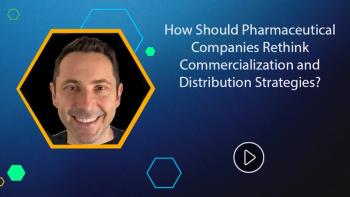
- Pharmaceutical Executive-11-01-2008
- Volume 0
- Issue 0
Pharm Exec Q&A: Tommy Thompson
The former health secretary offers a reality check on healthcare reform-and what to expect from the pols in '09
By the time you read this, the 2008 Presidential election will have already been decided. And all the debate and discussion over the candidates' merits will instead be directed toward better understanding how the impending presidential policies will translate into action.
But if you're like us, the discussions surrounding healthcare in the run-off left a lot to be desired. It all just seemed so, well, vague.
So we called up someone decidedly in the know, Tommy Thompson, who served a long career in government, most recently as the Secretary of Health and Human Services during the outgoing prez's first administration, to offer a reality check on the most pressing healthcare issues. Today, Thompson is an independent senior advisor of the Deloitte Center for Health Solutions and a partner at the law firm of Akin Gump Strauss Hauer & Feld. But perhaps his tenure in government is hard to leave behind: He backs the current system of healthcare with small changes that can have a big impact—and that have bipartisan support.
Thompson sat down with Pharm Exec in October and provided some hard numbers and also some hard-to-avoid scenarios—particularly with Medicare, now on schedule to go bankrupt. The data show there are efficiencies throughout the system to be gained (including implementing a mandatory diabetes screening for seniors and an employee retention program at FDA). Indeed, in an election where "change" has been the mantra, Thompson offers some solid steps in moving the system in a new direction—toward keeping people healthy rather than treating them when they are sick. What follows is an edited transcript of our discussion. —Patrick Clinton, Editor in Chief
People forget that you were a candidate in the current presidential race. If you were still on the stump, what would you be telling voters about healthcare?
Tommy Thompson: The first thing you have to look at is Medicare. Medicare is going broke in the 2012, and it has the potential of sinking our healthcare system just because it is so big.
When I was secretary, we wrote into the Medicare Modernization Act a provision called the Trigger. Once Medicare in two consecutive years spends 45 percent of the cost of healthcare out of the General Fund, the president is required to put a fix-it bill in front of Congress. The two years are up, and when the next president gets sworn in on January 20, he has 90 days to put a repair bill in front of Congress. Congress doesn't have to take it up, but it will bring front and center to Congress how serious the situation is.
Second, the continuing resolution that's keeping SCHIP [the State Children's Health Insurance Program] alive expires March 31.
Third, there are two areas of healthcare where Democrats and Republicans have reached some agreement. The first is wellness, chronic diseases, disease prevention, and disease management. There's a bipartisan coalition developing around this area—which accounts for 75 or 80 percent of the cost of healthcare. The second is information technology—including electronic medical records. Information technology also has bipartisan support—both presidential candidates are talking about it, both parties are talking about it in Congress—and Speaker [Nancy] Pelosi says it's going to be taken up early in the next session.
So with that, you have the areas that comprise 80 percent of the cost of healthcare, plus IT that will drive efficiencies, transparency, and more communications in the system. You've got Medicare which has to have the fix-it bill, and you have SCHIP. Those four proposals are going to be in front of Congress next year, and I absolutely believe that is going to drive the largest transformation of healthcare that any of us have ever seen.
What's going to happen?
Now, I don't believe that Congress can handle the Medicare problem, it is so large. Right now, Medicare takes up about 3 percent of the Gross National Product. Social Security takes up about five percent. But in 75 years, Medicare goes from 3 percent to 15 percent of GNP. Social Security only goes from 5 percent to 7 percent. The second thing is, the Gross National Product in America today is $13 trillion. The unfunded liability of Social Security is about $12.5 trillion in 75 years. What do you think the unfunded liability of Medicare is going to be in 75 years?
More than the current Gross Domestic Product?
By a large amount. The lowest estimate is $33 trillion. The highest estimate is $68 trillion. When you look at those numbers, it's impossible for Medicare to continue. Nobody's willing to talk about it in detail, but that's what's facing this country.
And what will it take to fix it?
First, you're going to have to means-test Medicare. The more money you make, the more you're going to have to pay for Medicare. It's not going to be free anymore.
Second, [right now] you don't get Social Security at age 65 anymore. Every year it's extended out one or two months, so if you're 65 now, you won't get your first Social Security check until you're 66. The same kind of thing is going to have to happen with Medicare.
And third, you're not going to have all the Medicare benefits we currently get. There are going to have to be some limitations on new medicines coming on the market or new devices that cost thousands of dollars. We're going to have to do something about the end of life because 30 percent of the cost of Medicare comes in the last year of life.
Do you know any Republican or Democratic representative or senator who will raise any of these issues?
I believe sincerely that the only way to fix Medicare is to handle it like a Base Closing Commission setup. Congress cannot close military bases on their own. They have to set up a Base Closing Commission, with an equal number of Republicans and Democrats. They make these tough decisions and then have Congress vote it either up or down. And that's the same type of commission that we need for Medicare.
Next you have to take a look at where the money is being spent. It turns out that 75 to 80 percent of what we spend is for chronic illnesses. And most chronic illnesses are behavioral—meaning that you or I have some control over them. So we have to figure out a way to do wellness and prevention. For instance, we should be selling insurance to keep you from getting sick instead of insurance to pay for you after you get sick.
One of the big drivers is tobacco. It costs us $150 billion in healthcare costs—442,000 Americans died last year from tobacco-related illness. We have to look at ways to encourage smoking cessation in America.
Tommy Thompson IN BRIEF
There's enormous opposition to things like regulation of tobacco by FDA.
We should regulate it, without a doubt. Why not? Why should we allow a company to put out a product that kills 442,000 people each year and costs you and me $150 billion?
What about the politics?
The politics are going to be rough, but I'm telling you what has to be done. Healthcare is going broke. It cost us $2.4 trillion this year, and it's going to grow to $4.6 trillion by 2015. It's growing at the rate of 9 to 10 percent a year. We have to cut that to 4 to 5 percent—the rate of inflation—to maintain a healthcare system that allows us to be economically competitive.
Next comes diabetes. Last year, 18 million Americans had Type 2 diabetes. This year, 24 million. It costs us $135 billion a year. There are 41 million more Americans who are prediabetic. And an exhaustive study by the National Institutes of Health has found that if we lost 5 to 10 percent of our body weight and walked 30 minutes a day, we could reduce the incidence of Type 2 diabetes by 60 percent.
Another fact that most people don't know is that 30 percent of the individuals going into Medicare this year are Type 2 diabetic, and 50 percent of them don't know they are. Can you imagine how much we could save Medicare if we put the emphasis on preliminary physicals before going into Medicare and get them started getting treatment.
Then there's obesity. We have to recognize that in this country, we're causing it with our high fat concentrates and food consumption. Twenty-five to 30 percent of our children are overweight or obese, and we have to do something about that. This is going to be a huge emphasis next year in Congress.
Another big topic is disease management, especially in the poorest of the poor who are on Medicaid, because 20 percent of the people on Medicaid are responsible for 70 to 75 percent of the costs. We're going to have to intensely manage them and try and get them, if nothing else, to take their medicines on a regular basis.
DID YOU KNOW?
What kind of system do you favor?
People always say, "Let's adopt the European system." Well, the European system is fraught with all kinds of problems; they have self-limitations like you can't believe, and I don't think Americans would stand still for it. I'm afraid of government control. Now, a one-payer system doesn't have to be government controlled, but that usually is the way it goes, and it stifles innovation.
In a government-controlled system like Europe, about 75 percent of the new drugs are coming out of America, because we have a market-based system. I'm afraid that if we go to a government-control or one-payer system, we will lose that innovation.
So the market system we have is running us over the edge of the precipice, and a single-payer system is not going to work. Can we really save enough money the way you're describing?
Just having the requirement that every senior going into Medicare has to have a physical for diabetes is going to be a huge money saver. Having some kind of limitations on end-of-life care—it's going to be controversial, but Europe does it. We can save Medicare and at the same time provide for the pharmaceutical industry, the biotech industry, so that they can develop new compounds—even though I don't think they're developing them nearly as fast as they should.
The mapping of the human genome was supposed to unleash all kinds of new targets. We had dinner last night with [NIH chief] Elias Zerhouni—he thinks that the next five, six years are going to be fantastic, and so do I.
One of the drivers of rising healthcare costs is rising standards. It's not just inefficiencies. We keep finding ways of letting people feel better or have better lives.
There's no question about it. That's why you've got to be able to overhaul the healthcare system completely for the new products to come out. I want that progress to continue. I want my granddaughters not to have breast cancer. Our system in America is the best way to find cures. And that's why I believe the healthcare system we have is worth saving.
Many of the ways you want to save money involve changing the way people live. How do you propose getting people who are a little—or a lot—apathetic to do this?
One way is by developing a new insurance policy. Right now we have insurance that pays after we get sick. I want insurance to pay to keep me from getting sick. I also want to go to corporate America. In the Deloitte Center for Health Solutions we did a poll and found that two-thirds of the Fortune 500 companies are going into wellness and prevention. Another one-third are looking at it.
I just saw that one of the big fast food companies now is putting out calorie counters. These things are starting to come together to make people healthy. It's going to start changing human behavior.
We're not talking about penalizing people who are sick, though?
No, with one big exception—tobacco. In my company, we charge higher insurance premiums for a smoker. But we give them a better deal. We will charge that person more—I think it's 50 bucks a month—for his or her health insurance program. But if that person will bring the whole family in for an anti-smoking program, we pay for it. And then if they quit smoking, we reimburse them their money and give them a bonus. That's the way you can change human behavior.
Incentives get people to live healthier lives. But we still have millions of people who don't have insurance of any kind.
Forty-seven million who don't have insurance and 25 million who are underinsured. That's huge. I would require every state governor to put the uninsured into an insurable class, and then put it out for bids. Let's say the state of New York has 1 million uninsured. It's more than that, but let's call it a million. We'll put a million people out for bids and then allow any health insurance company in America to bid on it. There would be a bid for single-enrollees, for families, one with high deductibles, one with health savings accounts and HRAs [health reimbursement arrangements]. Insurance would be mandatory, but for those under 125 percent of the poverty line, the state would subsidize them or use the McCain model of $5,000 per family to buy health insurance.
You would be absolutely amazed how competitive and reasonable those health insurance companies would bid. When you look at the composition of those that are uninsured, about one-third are between the ages of 18 and 34. They're healthy and they don't think they're ever going to get sick, so they just don't buy it. About 30 to 35 percent make over $60,000, $70,000 a year, so they're well-to-do. There are some who are going to be very sick, and you're going to have to put that in the mix, but overall the rating is going to be a reasonable class.
When we did this on Part D, we didn't know if we were going to get any bidders. We thought that if we could get three companies to bid nationally and 10 companies to bid regionally, we would be successful. Lo and behold, our three national companies turned into 10, our regionals from 10 to 60, and some places close to 100. We had a plethora of choices, maybe too many. But people came in and bid, and drug costs for the seniors are relatively stable, and 82 percent of the seniors like Part D. Now, there is no other program in the federal government that 82 percent of any class approves of. You couldn't get 82 percent of seniors to approve of free ice cream and apple pie. And yet they like Part D. It shows that the marketplace does work.
If you were a head of a pharmaceutical company right now, what would you do to be ready for the new world of healthcare?
I'd hire Tommy Thompson.
And for the ones who can't?
I would analyze my company and give it a complete spring cleaning and adjust it to the directions that I want to invest the money in. I think that's what Pfizer is doing with getting out of the heart space. Pharmaceutical companies are going to have to look at where their niche is because it costs so much to develop drugs. They have to become much more focused on the areas of healthcare where they can become experts and specialists—in diabetes or Alzheimer's, mental problems, heart problems, devices, whatever it is. They can't do the big gamut.
And they've got to find new compounds, so I would work very closely, much more closely than the pharmaceutical companies traditionally do, with the research centers and the hospitals and the medical schools around this country. And I would put some of my money into the research labs at the University of Wisconsin for cancer or stem cells.
I would also be working extremely hard to develop—for my own good—a program on a Critical Path with the FDA. I would push very hard for a Phase IV so I can get my drugs to market faster.
And I would try to change the policies and programs of FDA so the agency is able to recruit scientists and pay them higher wages so they stay with FDA.
When you were at HHS, you said you wished you could negotiate directly with drug companies over prices for Part D. How do you feel now?
I'm opposed to it. If you have the Secretary negotiating for a drug you will have the tendency to disrupt the market. We're seeing too much erosion already of our market system. When you look at having one individual have the awesome power to completely control the price of drugs, you're going to stifle the innovation of pharmaceutical companies.
What do you think when you look at FDA and its current problems?
As an institution, I see a very bright future. There are four things FDA needs: First, it needs the next president to appoint a commissioner early on. We went way too long before having a permanent commissioner during the Bush administration. We had acting commissioners for almost half his presidency. That in itself seems to detract from the structure and the morale of the agency.
Second, to maintain standards you have to hire capable people and you will have to pay them appropriately. So you are going to have to increase the budget—and that's what the Coalition for a Stronger FDA is all about, improving the budget. We were very successful in the last supplemental appropriation; we received another $150 million dollars for the first half.
The third is retention. We have to make sure that people stay in their jobs for a long time, instead of having the law firms and biotech and pharma firms hire them away.
The fourth one is the Critical Path, which will get drugs to market faster.
Is the current level of distrust in FDA warranted or exaggerated?
I think it is to a certain degree exaggerated. The caliber of individuals at FDA is outstanding, and they get a bum rap for the fact that morale is low, the job is immense, the resources are slim, and vacancies are too many. And that's causing the erosion from what needs to be done at FDA. That's why Congress on a bipartisan basis needs to join with us and work to improve FDA.
Who would you like to see serve as the next FDA commissioner?
We have had some good FDA directors in the last eight years—Mark McClellan, Les Crawford, Andy Von Eschenbach. I think they have been exceptional. I know there has been some criticism, but their hearts are in the right place, I know the direction they are trying to lead, and I know the effort and the passion in FDA are without equal. But this time, post-Bush, the most outstanding person I can think of on either side of the aisle is Elias Zerhouni.
I don't know if he would take the job, but Zerhouni would bring a whole new talent set to FDA, which it needs. He is an outstanding scientist, a wonderful doctor, a great administrator—one of the best, if not the best, administrators in the history of NIH. He has seven or eight patents, he has taken several products to market through FDA, and has built businesses around them. You can't beat someone with those qualifications.
There's a trend to try to regulate pharma at the state level through legislation and lawsuits. Some argue this is a necessary market approach. But it creates problems for FDA and for the industry. How do you feel about this approach?
You're not going to stop it. Whether it is right or wrong, it's going to continue. I think you have to find a way to make sure there are no contradictions between FDA and the state levels.
How do you feel about pre-emption?
I think you have to have it. FDA is the gold standard. When governments internationally gauge their drugs, their marketing, and their standards, they look to what FDA does. You cannot really function if FDA didn't have pre-emption.
In 2003 you were elected as the chair of the Global Fund to Fight AIDS, Tuberculosis, and Malaria. How do you see global efforts fitting with domestic healthcare reform?
What we need to do is what I call "global medical diplomacy." It doesn't mean that we shouldn't have an aggressive State Department and strong military, but this is really going to the heart of what America is all about. Right now, America is looked on with some degree of suspicion and trepidation. Where better then to put our resources into than improving the medical condition of places around the world.
It's about improving the hospitals and the training centers in Afghanistan, where we remodeled a women's hospital, and where 750 women showed up on Easter Sunday in 2003 to thank me and the United States. Or in Indonesia, where they were very anti-America. We sent a hospital ship, Mercy, over there with volunteer doctors and nurses and technicians spent six weeks sailing the islands. As they left the port of Jakarta, tens of thousands of people were waving the American flag, thanking us for the great medical assistance.
You look to the Global Fund that has more than 300 programs in 135 countries and has doled out billions of dollars and has something like $8 billion to give out to fight AIDS, TB, and malaria. Add to that the PEPFAR program, which President Bush started and will probably be the most successful program in his legacy. It's these kinds of things that can capture the attention of the world—and it's just better than anything else that is going on in the fight against terrorism.
Articles in this issue
over 17 years ago
RxClub Awards 2008: Powerful & Simpleover 17 years ago
No Ordinary Joeover 17 years ago
The Mess in MSover 17 years ago
Resolving Conflicting Interestsover 17 years ago
Size Doesn't Matterover 17 years ago
Over Thereover 17 years ago
Making Sense of Salesover 17 years ago
Tech Toysover 17 years ago
Gilding LillyNewsletter
Lead with insight with the Pharmaceutical Executive newsletter, featuring strategic analysis, leadership trends, and market intelligence for biopharma decision-makers.




